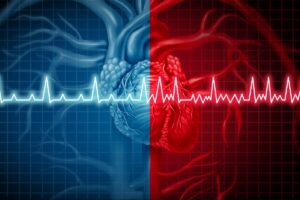Guest Blog: Binge Drinking Can Cause ‘Holiday Heart Syndrome’


Holiday heart syndrome is a common problem. It refers to the development of an abnormal heart rhythm called Atrial Fibrillation (AF) following the consumption of large quantities of alcohol over a short period as is not uncommonly seen in youngsters during holidays. During holidays, people’s eating habits deteriorate, they become very lethargic, alcohol consumption increases, and as a result, heart problems arise. Alcohol, fast food, and junk food consumption increase such problems. The term “Holiday Heart Syndrome” first appeared in the medical literature in 1978.
The Copenhagen City Heart Study identified over 1,000 cases of atrial fibrillation among 16,500 men and women. Heavy alcohol use was responsible for 5% of atrial fibrillation cases in men. And the risk of developing the condition was found to be 1.5 times higher in binge drinkers compared with those who drank moderate amounts of alcohol or no alcohol at all. Why drinking alcohol is related to the development of this abnormal heart rhythm is unclear. There may be a direct toxic effect of alcohol on the cells of the heart muscle or indirect toxic effects from breakdown products (metabolites) either on the heart itself or other organs, such as the endocrine adrenal glands, which are located on the top of each kidney.
Dr. Anjan Siotia, Director of Cardiology, at BM Birla Heart Research Centre explains, “If the holiday heart syndrome continues for a while and is left untreated, it could lead to complications like a weak heart and even strokes. Many people enjoy a tipple over the festive season but overdoing it could cause “holiday heart syndrome”, a condition where the heart beats abnormally – known as atrial fibrillation. This is often experienced as a fluttering in the chest. Atrial fibrillation is rare in people under 30, and isolated episodes of it in the young are often attributed to endurance exercise, recreational drug use, and obesity. However, a common cause is binge drinking”.
One should seek immediate medical care if they have experienced symptoms such as:
- Dizziness
- Palpitations
- Difficulty in breathing
- Chest pain
- Loss of consciousness
Dr. Siotia also says, “Fortunately, holiday heart syndrome tends to be acute after bouts of drinking. When individuals stop drinking, it tends to resolve on its own. So, if you notice a faster-than-normal or fluttering heart rate while drinking, it could likely mean you need to lay off the mulled wine.
“It’s an illustration that anything in excess is not a good thing. So, the advice that we give our patients for everything from alcohol to caffeine to supplemental vitamins to exercise is ‘everything in moderation’ is a good rule to follow. You can’t overdo it. Holiday heart syndrome is something that illustrates that very well.
About the author-Dr. Anjan Siotia, Director of Cardiology, at BM Birla Heart Research Centre
